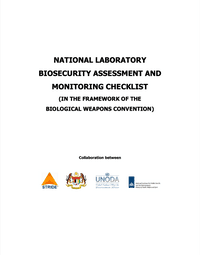National Laboratory Biosecurity Assessment and Monitoring Checklist
[Malaysian Biosecurity Checklist]
This checklist was the outcome of bilateral engagement between Malysia and the Netherlands that aims to integrate biosecurity practices into Malaysia's national biorisk management programs. The biosecurity checklist consists of a set of concrete questions for each key biosecurity area that will allow laboratories to assess their risk, identify gaps, and ensure compliance with national and international standards.
SUMMARY
The National Laboratory Biosecurity Assessment and Monitoring Checklist was created to enhance Malaysia's biosecurity capacity by assisting laboratories, especially high containment laboratories, in assessing their laboratory's risk, identifying gaps, and ensuring compliance with national and international standards. The checklist is a survey-driven tool that consists of a set of concrete questions for each key biosecurity area.
The checklist was created by Malaysian and Dutch experts and is based on national and international guidelines and regulations. It covers the following areas: management, biosecurity awareness, physical security, accountability for materials, information security, transport security, personnel reliability and emergency response.
The tool is the outcome of two 3-day workshops conducted over the course of four months in 2018 in which Malaysia collaborated with the Netherlands. This bilateral engagement aimed to integrate biosecurity practices into Malaysia's national biorisk management programs. The workshops were co-organized by The Science and Technology Research Institute for Defense (STRIDE) in Malaysia and the Implementation Support Unit (ISU) of the Biological Weapons Convention (BWC), United Nations Office of Disarmament Affairs (UNODA), and sponsored by the European Union (EU) and the Netherlands Ministry of Foreign Affairs. Malaysia was one of the BWC states parties that was selected through the Extended Assistance Program offered by the EU to support the BWC.


..png)
